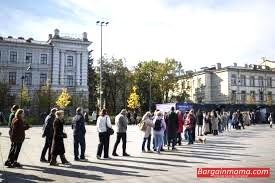Lithuania’s parliamentary elections appear to be favoring a centre-left victory, with the Social Democratic Party (SDP) emerging as the frontrunner to replace the current conservative government. While domestic policy changes loom, the nation’s steadfast commitment to NATO, the EU, and Ukraine remains unchanged amid ongoing regional security concerns.
The first round of voting saw the SDP secure 20 seats in the 141-seat parliament. Party leader Vilija Blinkevičiūtė, currently serving in the European Parliament, is working to build a coalition with the Democratic Union “In the Name of Lithuania” and the Lithuanian Popular Peasants’ Union, targeting a minimum of 80 seats for a majority.

Despite the country’s focus on foreign policy and defense – maintaining NATO spending at 3.2% of GDP and substantial Ukraine support – domestic issues dominate the electoral discourse. The SDP’s platform emphasizes economic reforms, including progressive taxation and increased pensions, responding to voters’ concerns about social inequality and financial stability.
Coalition formation presents challenges, particularly regarding the third-place finisher, Nemunas Dawn, a populist party that secured 15 seats. Led by Remigijus Žemaitaitis, who faces legal scrutiny over alleged antisemitic statements, the party remains a controversial potential partner that the SDP has explicitly rejected.
Political analyst Rima Urbonaitė notes that while parties differ on domestic policies, they maintain unity on foreign affairs. This alignment reassures President Gitanas Nausėda, who emphasizes the importance of maintaining stable governance and strategic continuity.
The election results are particularly significant for citizens like Tomas Valiūnas and Valerija Žaltauskienė, who represent younger and older generations respectively, both hoping for improved social services and economic conditions. Many voters associate recent inflation and economic challenges with the outgoing conservative government and look to the Social Democrats for solutions.
As vote counting continues, observers anticipate a significant shift in domestic policy under potential centre-left leadership, while expecting Lithuania’s strong international positions, particularly regarding NATO and Ukraine support, to remain unchanged.



